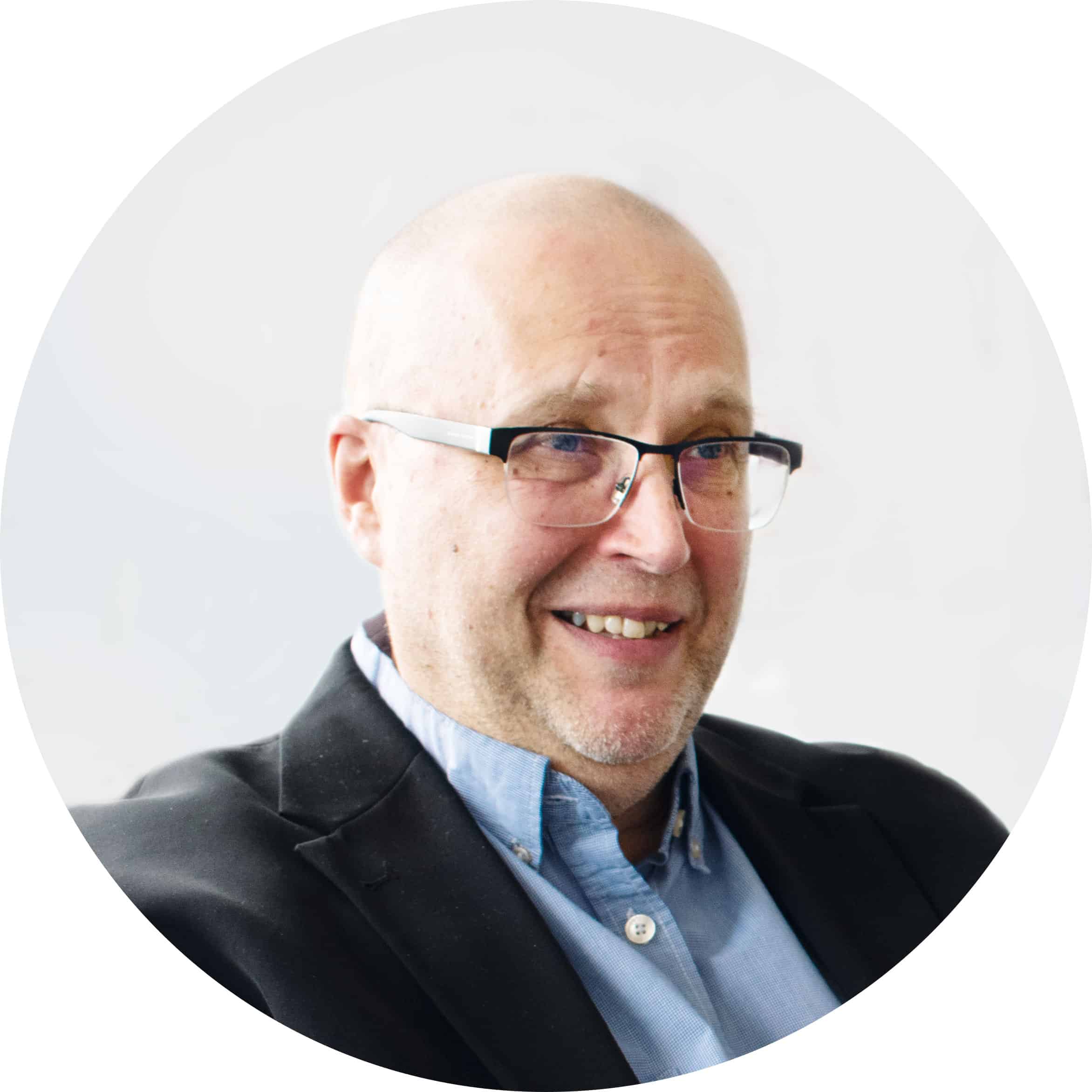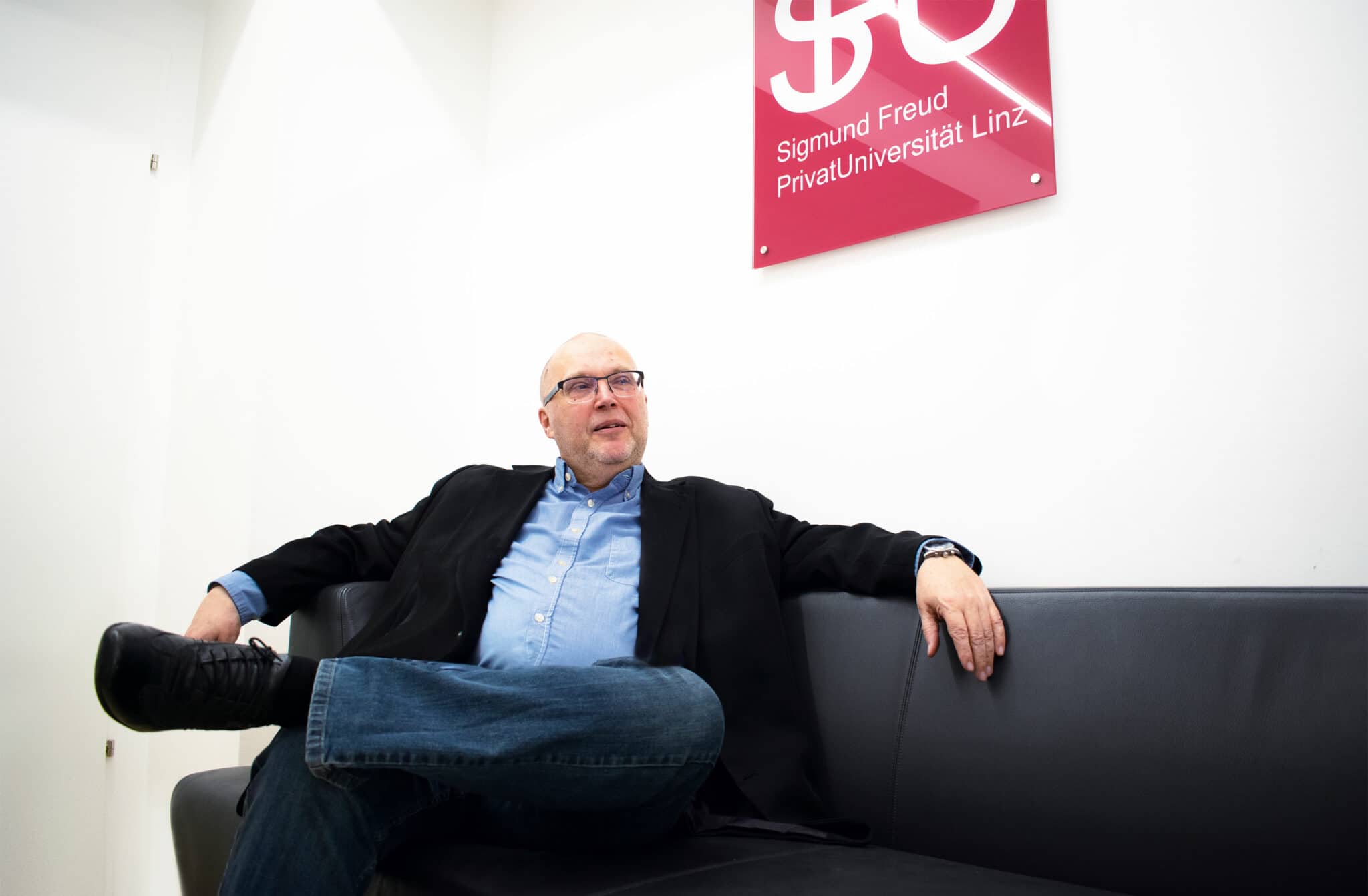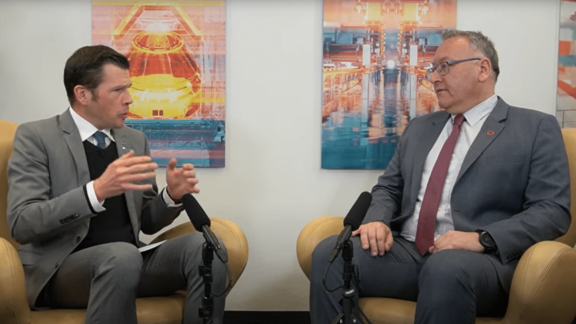Over a century ago, the theories of Austrian neurologist Sigmund Freud began to conquer the world. The unconscious, the Oedipus complex, the interpretation of dreams: today, Freud’s ideas are an integral part of what Western cultures believe to be the fabric of the human condition. They have also made massive contributions to scientific disciplines such as psychology and sociology. Prof. Thomas Stephenson leads the psychotherapy science department of the Linz location of Sigmund Freud University. We sat down with him to discuss what makes us tick, what makes us innovate, and what we should make of the post Covid-19 situation.

Professor, you are leading the psychotherapy science department in Linz—is this a new academic field?
Professor Thomas Stephenson: The field itself, strictly speaking, is not new—because much research has been done in the wider academic realm. But Freud always wanted his ideas to live on in universities, and it was only with the founding of Sigmund Freud University in 2005 that this goal was truly met. Having said that, here in the psychotherapy science department, we are indeed facing the specific challenge of establishing a new research method. Not all aspects of the traditional scientific approach apply here; we are focusing on the subjective and the intersubjective experience of individuals, and are thus dealing with some very fluid subject matter.
Covid has affected the mental health of many. What are the signs indicating that one should seek advice?
Stephenson: I think that Covid is causing a lot of fragmentation and deterioration—in our societies in general but also in families, couples, and individuals. This is a global phenomenon. Prior to Covid, a limited number of people were showing troubling symptoms. Many others, who may have had a disposition, were able to suppress their problems and keep them underneath the surface. Now, what Covid has effectively done is lower the threshold for these issues to appear and cause problems. So if you notice that your emotions or your thoughts have changed—that you are feeling and thinking things that seem foreign to you—you may be suffering from the stress inflicted upon us by the pandemic and its ramifications. There are usually three ways in which humans react to stress: fight, flight, or freeze. The “fight” reaction can lead to violence, the “flight” reaction to addictions including spending excessive amounts of time online, and “freeze” manifests in apathy and depression. None of these outcomes is very desirable.
I see us living in a world where each and every one of us is free to do what we are actually good at.”
How can companies best prepare their workforce for the time after Covid?
Stephenson: The obvious answer is that companies should hire an adequate number of psychotherapists [smiles]. But I do have a vision for the post-pandemic future, and it centers around a new mindset that puts sustainability at the center of our activities. Today, we still live in a world that encourages competition, overproduction, and the generation of artificial needs. We have become predators without instincts or boundaries, and we are rewarded for aggressive behavior. Consequently, our potential for destruction is enormous. I feel that change is due, and is coming—in part because of Covid. Our idea of work will undergo a deep transformation. For that to happen, the East and the West will have to unite, open up, and learn from one another, so as to let a new mindset emerge. Eventually, I see us living in a world where each and every one of us will be free to do the things we are actually good at. Life will feel much more meaningful under these new circumstances.
Is there an intersection between psychotherapy science and technology?
Stephenson: Yes, both areas have been impacted by digitalization—first of all because digitalization has revolutionized how we communicate. Even more importantly, it has called into question our understanding of the human mind, by virtue of new advances in artificial intelligence. Will AI ever reach a level of consciousness that compares to that of a human being? And if so, to what extent will this new consciousness be of a personal or interpersonal nature? I think that many disciplines are trying to answer this fascinating question.
Are there any other recent technological developments that have captured your imagination?
Stephenson: CRISPR gene editing comes to mind. It prompts many ethical questions. It makes you think about what it is that defines us as individuals. And it reminds us of the distance we still have to go to arrive at a holistic understanding of the human condition.
Digitalization has called into question our understanding of the human mind and of human consciousness.”
Is there any one innovator you particularly admire?
Stephenson: Prometheus. He was the forefather, the pioneer, of all innovation. When he saw a new path opening up before him, he simply had to take it—no matter what. He lived and breathed total dedication. “There is something that needs to be done for the good of all humankind, and I am the only one who can pull it off”—it was this belief that fueled his determination. Even though he is a mythical figure, I find him utterly inspiring.
Is innovation necessarily disruptive, or is incremental refinement just as good?
Stephenson: I think that both principles are valid and have their place. Personally, I tend to lean more toward promoting disruptive innovation—it is just more fascinating to me. But there is one aspect to incremental progress that I appreciate quite a bit: If a researcher provides the scientific community with a comprehensive, “big picture”-type overview of the current state of affairs in their field, this can be an excellent basis for future contributions. We all need these kinds of contextual frameworks—even if we then choose to act more disruptively ourselves. In the field of psychotherapy science, we encounter both principles: when individuals learn to re-tell their personal story—to re-frame their lives—, they may do so taking small steps or giant leaps.

What’s the best method for nurturing creativity?
Stephenson: The answer is simple. It is love.
What’s the next big thing in the humanities, and in psychotherapy science in particular?
Stephenson: My inner prophet tells me that three things will be of the essence: affectedness, mindfulness, and humility—all subjects on which I would like to see people write books. Due to Covid, we are now all in the same boat: We are all concerned, all stuck in the mud. Collectively, we’ll have to come to our senses. And then we must all be humble and appreciate that, in a world of great diversity, there can be no moral high ground. There is no universal right or wrong, and yet we must find common ground to move on after the pandemic.
And if we should struggle to achieve this unity in diversity, we might turn to psychotherapists for help …
Stephenson: That’s exactly right.
You are based in Linz, which is often called the “City of Steel.” Do you find the designation appropriate?
Stephenson: A few decades ago, Linz was almost universally thought to be a dirty place. Today, this could not be further from the truth. Linz has become one of the cleanest cities I know. Socially and culturally, it also has a lot to offer. I am glad to be here and to make my contribution to the educational landscape in Linz.
Founded in 2005, Sigmund Freud University quickly grew beyond its base in Vienna, Austria, and currently extends to locations in Linz, Berlin, Paris, Ljubljana, and Milan. The university’s first program was psychotherapy science, but it eventually added psychology, medicine (including dentistry), and law to its disciplines. Sports science will be the likely next step as the respective accreditation process is already underway. While Sigmund Freud University in total has over 5000 students and employs more than 1100 staff, the Linz location is still expanding and presently focuses on psychotherapy and psychology. Professor Thomas Stephenson has been associated with Sigmund Freud University since 2009 and has been leading the psychotherapy department in Linz since 2019.
To learn more, visit www.sfu.ac.at/en

